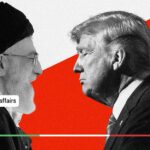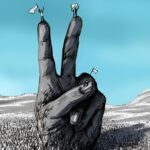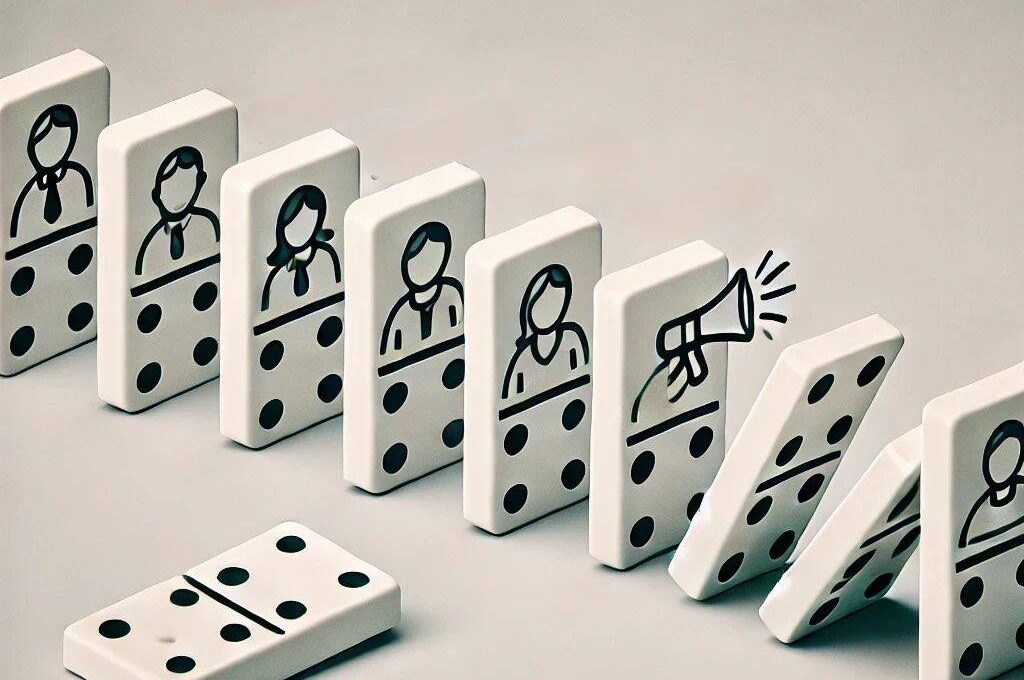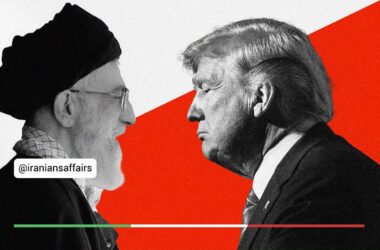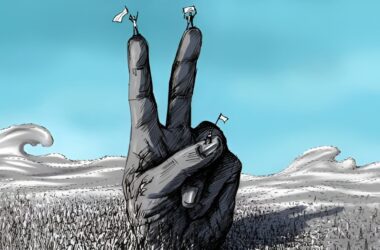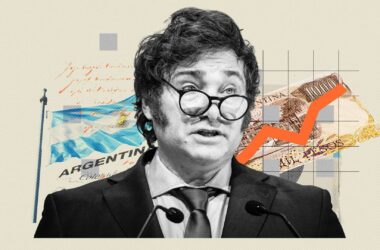Iranian politics faces numerous challenges but suffers from severe structural weakness. This condition, a consequence of deep and widespread repression on one hand, and the Islamic Republic’s security manipulations on the other, has led to dire consequences. One significant outcome is the breakdown of boundaries in the political arena, with celebrities entering politics, the politicization of media and journalists, and the detachment of civil society from the political core. This article explores this issue, and subsequent articles will address the roles of political parties and think tanks as key players in the political core.
The Role of Celebrities in Politics
The Role of CelebrIn today’s Iranian political landscape, celebrities wield significant influence in the public sphere due to their popularity and broad access to audiences. This influence has extended into the political realm, with their prominence surpassing natural boundaries. Celebrities often assume that popularity equates to legitimacy or competence in politics, leading them to propose political and activist solutions. While this may initially appear as an opportunity for social mobilization, the lack of political expertise and knowledge often results in misguided political struggles, reduced effectiveness of efforts, and even divisions among opposition forces. Therefore, the role of celebrities in politics must be redefined, with clear boundaries established.
The first step is to acknowledge that celebrities, as recognized and admired figures, can have a positive impact on public awareness. They can serve as intermediaries, transmitting key messages from politicians, parties, and think tanks to the public, thereby enhancing societal awareness. Their role in this regard should be facilitative, not policy-driven. Celebrities can highlight critical issues such as human rights violations, suppression of free speech, or the mafia-like mechanisms of the Islamic Republic, drawing public attention to these crises and helping mobilize support for social movements. This supportive role, when kept away from direct policymaking or political rivalries, can be constructive and beneficial.
However, problems arise when celebrities confuse their role with that of political activists. This not only diminishes the efficiency of political struggles but also exacerbates mistrust among various opposition groups. Popularity alone cannot substitute for the knowledge, expertise, and experience required in politics. Thus, it is essential for public discourse and media to draw a distinction between popularity and political legitimacy and to foster an understanding in society that politics is a specialized and complex field requiring skills beyond public fame.
One effective approach to managing celebrities’ involvement in politics is fostering meaningful collaboration between them and the political core. Political parties and think tanks should work with celebrities, leveraging their influence to amplify their activities. This collaboration can involve inviting celebrities to support campaigns, projects, or specific messages, but without allowing them to assume key decision-making roles. Providing political education to celebrities can help them understand that their role in politics is limited to raising awareness and support, while the responsibility for policymaking and movement leadership lies with political and intellectual institutions.
In parallel, the media must also play its role in addressing the presence of celebrities in politics. Media outlets should avoid exaggerating the political role of celebrities and work to clarify the different roles in the public space. They can contribute by offering in-depth analyses and thoroughly examining political perspectives, helping audiences better understand the true impact of celebrities and discouraging their perception as ultimate authorities.
Furthermore, public discourse should evolve in a way that encourages celebrities to recognize their limitations and refrain from direct involvement in policymaking or political decision-making.
The Role of Media and Journalists
Media outlets and journalists play a significant role in the struggle against the Islamic Republic. However, this role must be managed to ensure their independence and primary functions are preserved while avoiding role confusion and unnecessary involvement in politics or political competition. Unfortunately, the extreme weakness of the political core has occasionally led media outlets and journalists to act as primary political players. This situation creates ambiguity in roles, confuses audiences, and reduces the effectiveness of political struggles. As a result, it is essential to redefine the role of media and journalists in politics and establish clear boundaries for their activities.
The first step is focusing on the primary mission of media outlets and journalists: providing information, ensuring transparency, and holding power accountable. Their role is not to participate in policymaking or directly engage in political rivalries. Media should act as facilitators of public awareness, delivering accurate and impartial information to enable people to make informed decisions. In this context, their focus should remain on exposing corruption, inefficiencies, and atrocities while refraining from involvement in opposition factional debates or offering political solutions.
A key issue in the media landscape outside Iran is that some journalists and media outlets, due to the weak political core, mistakenly believe their access to pens and cameras grants them a license to engage in political activities. As a result, they offer political proposals and participate in opposition rivalries. This damages their credibility as impartial observers and fosters divisions, reducing cohesion among opposition forces. Since politics directly impacts people’s lives, any media outlet entering the realm of politics must disclose its financial sources transparently so the public can understand its position. To prevent such scenarios, media outlets and journalists must draw clear distinctions between their media-related and political activities. Journalists may analyze and critique policies, but they should not present themselves as political actors or policymakers. If a journalist intends to engage in political activity, they should resign from their profession and openly declare their political stance.
Transparency in roles is crucial in this context. Media outlets must recognize that their role is to inform and analyze, not to participate in politics. This transparency allows audiences to distinguish between professionally operated media outlets and those involved in partisan activities. Additionally, media should avoid exaggerating individual roles or endorsing specific parties or organizations.
To improve the performance of media in this regard, the role of parties and think tanks is vital. These entities must work to establish constructive relationships with media outlets and use their platforms to amplify messages and objectives. This collaboration could involve joint meetings or focused discussions to ensure that both sides understand their roles and responsibilities.
It is also important to acknowledge that media outlets and journalists are highly dependent on their audiences. Therefore, social pressure from audiences can play a significant role in correcting their performance. Educating audiences about the distinction between political analysis and direct political participation can enhance media literacy and encourage media outlets to focus on their primary functions.
The Role of Civil Society Organizations
Civil society organizations play a pivotal role in confronting the Islamic Republic. These organizations can act as intermediaries between the public and politics, conveying societal needs and concerns to the political core while enhancing public awareness and mobilizing social movements.
However, a major challenge arises when some civil society organizations deviate from their primary mission and engage in politics or partisan competition. This role confusion weakens the political core and diverts efforts from the overarching goals of the struggle. Under such circumstances, redefining the role of civil society organizations and establishing clear boundaries between civil and political activities becomes an essential priority.
The primary role of civil society organizations should be anchored in three fundamental pillars: representing public demands, raising awareness, and monitoring policymaking. These organizations must identify the social concerns and needs of various societal groups and present them to politicians and the political core in the form of reports or campaigns. Additionally, they should focus on educating and raising awareness among the public to facilitate social mobilization. However, this role should not entail direct involvement in political activities or the formulation of political solutions. Emphasizing specialized or sectoral missions, such as human rights, environmental protection, or social issues, while collaborating with the political core, is the best way to maintain neutrality and credibility for civil society organizations.
One of the pressing issues in the current landscape is that some civil society organizations reduce politics to meeting their narrow demands. They present themselves as political actors or directly compete with political parties and think tanks. This not only undermines the primary mission of civil society but also creates confusion about roles and weakens political struggles. To prevent this, civil society organizations must clearly define their mission for their audiences and refrain from proposing political agendas or participating in high-level political decision-making.
Constructive engagement between civil society and the political core is a critical way to prevent role confusion. Political parties and think tanks should leverage the capacities of civil society organizations to gauge public sentiment, expand their outreach, and amplify their messages. This collaboration can also involve utilizing data and specialized reports from civil society to inform comprehensive policies and programs. At the same time, civil society organizations must not position themselves as substitutes for political parties but should focus on their intermediary and oversight roles. Establishing joint mechanisms for collaboration between civil society and political entities can foster unity and cohesion among opposition forces.
Transparency and accountability are essential tools for preventing the deviation of civil society organizations. These organizations must maintain transparency regarding their funding sources, objectives, and activities to protect themselves from allegations of political bias. Additionally, being accountable to their audiences and maintaining neutrality in their work can bolster their credibility. This, in turn, enables them to play a more effective role in political struggles without engaging in partisan competition.
Ultimately, civil society organizations should strengthen the culture of civic activism while avoiding competition with political parties and think tanks. Educating their members on the boundaries between civil and political activities and focusing on collaboration rather than rivalry are fundamental steps in this direction. Civil society organizations must act as facilitators and observers, not as policymakers or political leaders. Only by maintaining these boundaries can role confusion be avoided, and a coherent and effective struggle against the Islamic Republic be achieved.
Strengthening the Political Core
The long-term solution for preserving the sanctity of politics lies in strengthening the political core. Parties and think tanks must regain their power and credibility to reclaim their natural position as the primary drivers of policymaking.
With these institutions strengthened, there will be no need for celebrities, journalists, or civil society organizations to fill the political vacuum. Future discussions will explore strategies to enhance the political core further.
